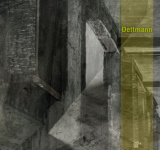|
|
 |
Dusted Reviews
Artist: Marcel Dettmann Album: Dettmann Label: Ostgut Tonträger Review date: Apr. 27, 2010 |

|
|
|
 |
The popularity of Berlin’s Ostgut nightclub in the years following its reopening as Berghain was the impetus for the creation of a new label by its owners, Ostgut Tonträger. It didn’t take long for the club’s resident DJs to garner acclaim, and for Marcel Dettmann in particular, this meant a new strain of techno that embraced minimal without rejecting the ruthless appeal of harder, faster sounds. His Berghain 02 mix was one of the best of the last few years, a manifesto both personal and political that showcased his abilities and allowed for contemporaries to blend with the classics.
Brilliant though it may have been, a mix is a different animal from your own full-length. Dettmann is his true debut, and while it will please Ostgut Ton devotees, there aren’t many surprises in store for the casual listener interested in seeing where the Berghain bunch will go next.
It starts promisingly enough, with “Argon,” a short clap-happy number that constantly leaves you tripping over the beat. But the middle of the album is dominated by ultra minimal techno claustrophobia dished out some six minutes at a time. The real deal-breaker for any listener will be the “Screen”-through-“Silex” stretch that make up the duration, seven air-tight songs in a row that are only temporarily alleviated by the buoyant-yet-distant “Drawing” and the upbeat “Captivate.” The latter is an Ostgut (or maybe Tresor) throwback with a bouncy synth that contrasts nicely with the clattering, insistent percussion that pins down both the song and most of the album. The helicopter blades (or distant machine gun fire?) of “Silex” having run its course, Dettmann mixes it up a bit in the final quarter – if you’ve made it this far, chances are you’ll appreciate the UFO sounds blanketed by static on “Home” or the ambient outro “Taris.”
Even after multiple listens, the impression one gets from listening to Dettmann is that the man has mastered mixing and can generate single tracks for maximum effect on the dancefloor with no problem. But he has not quite mastered the long player when his songs, so oppressively committed to the beat as they are, do not feature the tricks and turns that a producer of his capability (or visibility, at least) should be able to display. Dettmann is no disaster – far from it – but for all the huff n’ puff over Berghain’s big men in the last three years (Ben Klock, Shed, etc.), this feels like something of an obliviously straightforward showcase. The best still lies in waiting.
By Patrick Masterson
|







